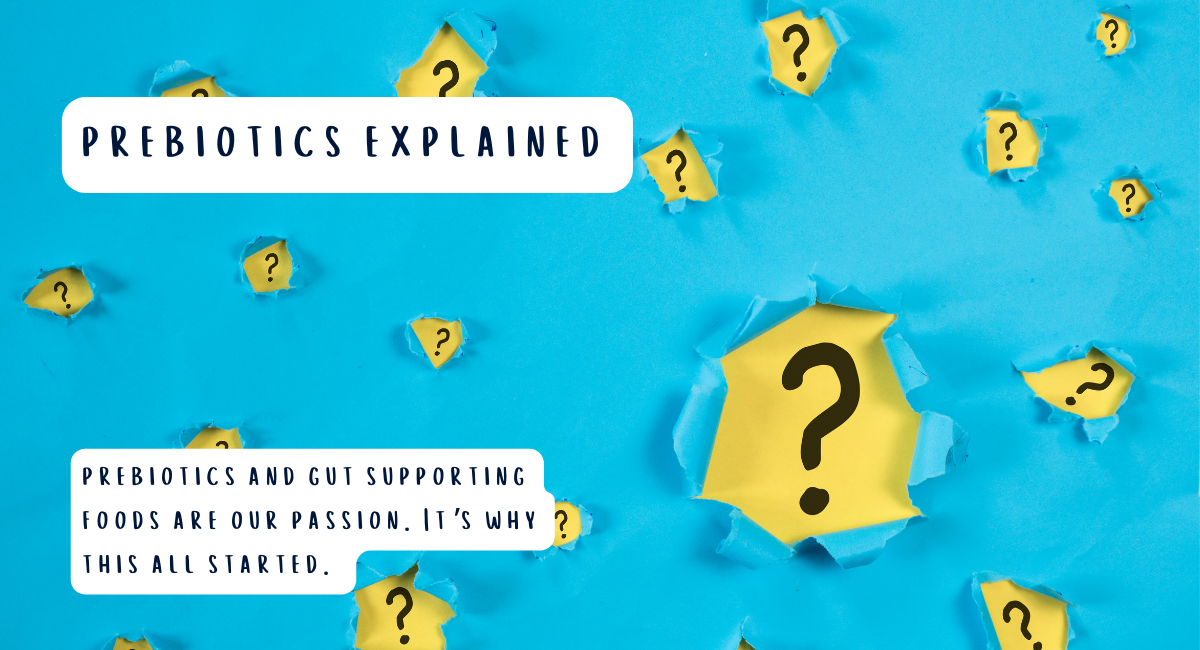
A BIT ABOUT PREBIOTICS
“The bacteria that are present in our gut benefit far beyond just the gut itself, playing a role in our immune system and even our mental health.” We borrowed that from Guts UK because we couldn’t say it better ourselves. Guts UK is the only UK charity funding research into the digestive system.
This page will give you an introduction to prebiotics. But we can only cover the tip of the iceberg! It’s a big and ever-growing area of science. But all good news for those of us who want to improve our gut, physical and mental health.
Most people have heard of probiotics, but probiotics have limited health benefits on their own. Probiotics need prebiotics to thrive. The process of probiotics eating or fermenting prebiotics creates postbiotics. It’s these postbiotics that bring us the real health benefits. Postbiotics include some vitamins and other substances that help us regulate and maintain good overall health. From head to toe and everything in between.
WHAT ARE PREBIOTICS?
Prebiotics are often referred to as dietary fibres – but, not all dietary fibres qualify as prebiotics. And Prebiotics go beyond fibre. Prebiotics also include other substances such as polyphenols.
According to the scientific consensus definition as quoted on The International Scientific Association for Probiotics and Prebiotics website, “a prebiotic compound must confer a beneficial physiological effect on the host and that effect should derive at least in part from utilization of the compound by resident microbes.”
In simple terms – a prebiotic is a compound that when used by your microbia benefits your body.
Microbia exists on our skin, in our mouths but most famously – in our gut. Your microbia consists of bacteria, fungi and other microorganisms. You’re quite the ecosystem! When we eat, we are eating for us and our gut microbiome. This is why eating the right food for your gut buddies has such a big impact on your health.
What's the difference between probiotics and prebiotics?
Probiotics
Live microorganisms
Also known as gut flora or microbiome
Feed off prebiotics to create postbiotics

Prebiotics
Food source for probiotics
Non-living plant fibres
Contained in lots of food and drinks
PREBIOTICS AND GUT HEALTH
Getting a good variety of prebiotics in your diet can do wonders for your gut and overall health. Prebiotics are specific types of fibre that your gut buddies, gut bacteria or whatever you like to call feast on. Just like us, they need to eat to be at their best.
The good news is prebiotics are found in our everyday food. No supplements or pills required! All it takes to increase your intake of prebiotics is to eat food containing them. It really is that simple.
- Constipation relief
- Mineral absorption
- Cholesterol levels
- Regulating metabolism
- Regulating immune responses
- Improving mood
- Improving heart health
- Improving brain function
- Strengthening the bowel wall
PREBIOTIC FOOD AND DRINK
Prebiotics can be found in loads of food and drink. Fresh fruit and veggies, oats and other common foods you’d assume are good for you do indeed contain prebiotics. But there are other foods, such as coffee, red wine and chocolate, that also have prebiotic-acting compounds such as polyphenols.
Foods high in prebiotics include Artichoke and onions which contain Inulin, mushrooms which contain Beta-Glucans, garlic with its Fructooligosaccharides and chickpeas or lentils containing Galactooligosaccharides.
We hand-pick prebiotic-based food and drink to include in the boxes each month. We might pick a product because it tastes amazing or we might include something that gives us an opportunity to highlight a type of prebiotic or group of prebiotics.
PREBIOTICS FAQ
Does how you cook your food effect the prebiotic content?
Yes and no. This depends on the prebiotic. Most fibre isn’t affected by cooking, but if you want to retain the most nutrients, then minimal cooking or cooking at a low heat is best. Steaming is also a good option. But raw – you can’t really beat it. Unless you’re talking potatoes – then raw is a no-no. But, potatoes are a funny one. If you let cooked potatoes cool and then reheat them, you can increase the amount of resistant starch – which is great for your gut health.
Is it possible to eat too many prebiotics?
If you’re not used to eating a lot of foods high in fibre, especially beans and pulses, then a sudden increase in high-fibre and prebiotic foods has been reported to cause bloating and a pretty uncomfortable time.
The Western diet is very low in prebiotic-containing foods compared to other cultures, especially in more rural communities. The best thing to do is to make dietary changes slowly and see how you feel. And if managing diet is part of managing a health condition then always consult a medical professional before changing your diet.
Are prebiotics for everyone?
Prebiotics are found in every day food stuff. So yes and no is the answer to this one. If you have a food sensitivity, are on medication or are managing your health in another way then always consult your health professional before making changes to your diet. There are mixed answers out there for this question. Some claim that food sensitivities are caused by gut imbalance and that reintroduction is the way forward, and others encourage you to stay away from the irritant. Whatever your view, prebiotics are what feed your gut buddies. How you increase or manage your intake may be a personal journey. One that we’d love to know about.
"Our food should be our medicine and our medicine should be our food."
Hippocrates – one of the most outstanding figures in the history of medicine
